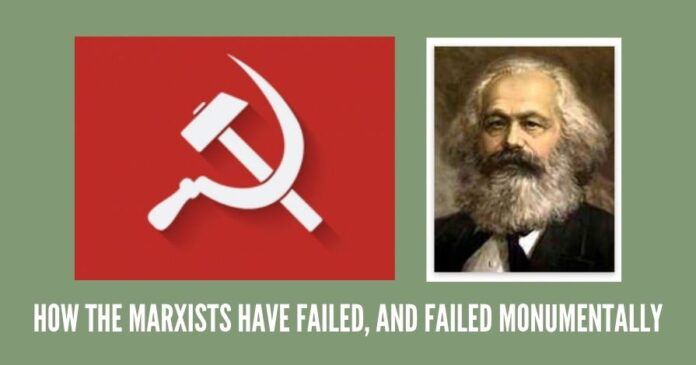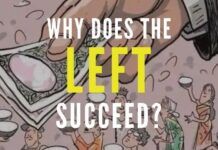
Indian comrades may have evolved since Marx’s time and abandoned the idea of violence as a weapon of change, but continue to live in the fossilized world of Marxist idealism.
Even as the political space for communists in India continues to shrink, our comrades are still unable to develop a narrative that is palatable to the vast majority of the country’s population. They claim to sense the pulse of the people because of their ‘rootedness’ but they have lost the art of reading the pulse. This is evident in the most recent example of the Sabarimala issue in Kerala. Earlier, they had fatally misread the public mood in Tripura and West Bengal. Today they have a government only in Kerala — and even there exists the real possibility of their being dislodged in the next Assembly election.
Marxists have maintained, in the true spirit of their ideological leader, that the transition can be violent, which in the larger interests of the working class or the proletariat is justified.
But the failure of communism has been global, beginning with their prophet Karl Marx. Although born in Germany, Marx spent decades in England where he propounded many of these theories on ‘class struggle’, put forth in two of his most celebrated works, Das Kapital and The Communist Manifesto. The essence of these books and his thoughts was that a revolution is inevitable in a society that is divided between the capitalists and the working class. By the latter, he essentially meant the industrial labor.
Now, the West, even in the 19th century during which period Marx had emerged as the leading voice of the communist idea, was the perfect crucible for such a revolution to occur, led from the bottom to the top. Countries such as Germany, England, and the US, not to mention those like France, had a strong industrial working class and the capitalist ‘wolves’. And yet, the communists failed, despite their best efforts and despite having managed to infiltrate the working class population. Let alone the bottom to top revolution, there wasn’t even a top to bottom upheaval, despite the communists — Marxists especially — having tall leaders who supposedly had the working class’s ears. It was a failure that was to set the template for the Marxists across the world.
True, the communists did manage to install their regimes, either in their name or in the garb of socialism, in some countries. But those have over the decades dissolved and become invisible. The only two big nations where communism gained ground was the then Soviet Union and China. The political ideology still rules the roost there, though the caveat is that the essentials of Marxism have been given short shrift.
In fact, the success of communism in these two countries (though the Soviets do not exist anymore, the communist rule does in what is now Russia, while it does not in many other countries that were spawned pursuant to the Soviet Union’s disintegration) is not really something that the Marxists would like to celebrate. In the first place, as opposed to Marx’s preference, in both the Soviet Union and China the communist order was established from top to down. It was not an outcome of any revolution led by the working class or even later helmed by it. Mao in China and Lenin in the Soviet empire constructed the communist narrative in their respective countries by keeping themselves at the core. In other words, both these nations had a communist revolution that was maneuvered and manipulated by individuals driven by their own vested interests and personal agenda. Over a period of time, they came to be dictatorial, crushing the very population which was supposed to be the spine of the revolution as envisaged by Marx.
Secondly, Lenin and Mao ensured that their brand of communism was socialist in nature — or what they interpreted to be socialist. There was no trace of Marxism either at the beginning of the formation or later when the regimes had matured and gained public acceptance — though more from force than in a voluntary sense. Marxists have always held that socialism is just one notch down from Marxist communism, meaning that a Marxist order generally follows experimentation with socialism. They have also maintained, in the true spirit of their ideological leader, that the transition can be violent, which in the larger interests of the working class or the proletariat is justified. But neither Lenin nor Mao showed any interest in ‘progressing’ to the next level of Marxism. Of course, the failure to transit did not exclude violence. Millions of lay citizens paid a heavy price, often with their lives, for their failure, or even perceived failure, to be on board.
They condemned profit while the rest of the population saw benefits in it; they demonized the capitalists whereas the working class saw the capitalist system as a medium for gainful employment.
Thirdly, the (forced) success of communism in China and the Soviet Union came about in the absence of one element which Marx had laid down as absolutely necessary for his kind of revolution: The presence of a large industrial working class population, oppressed and straining at the leash to be set free from the ‘tyranny’ of the capitalists. In neither of the above two countries did an industrial working class of any significance exist, because these countries were then not industrialized in the sense that the Western nations were. Both China and the Soviet Union had a large peasant population which was unorganized (unlike in the West where the industrial workers had unions etc), which was tyrannized by the order that came with the stated purpose to rescue them from poverty and underprivileged.
Various explanations have been offered by Marxist theoreticians over the decades for the failure of their idea in the West, at least in terms of securing power through a revolution, and their marginalisation in the East — both in Asia and Europe, but the fundamental fact is that the Marxists, Karl Marx included, were always barking up the wrong tree. They condemned profit while the rest of the population saw benefits in it; they demonized the capitalists whereas the working class saw the capitalist system as a medium for gainful employment; they spoke of violent confrontation between the proletariat and the bourgeoisie but the industrial worker, already fatigued by what was admittedly not the most ideal working conditions, was not in a mood to take up arms and further complicate his life.
Indian comrades like Prakash Karat and Sitaram Yechury may have evolved since Marx’s time and abandoned the idea of violence as a weapon of change, but they still continue to live in the larger fossilized world of Marxist idealism. That is why they got the Sabarimala issue wrong. That is how they failed to grasp the aspirations of people, whether in West Bengal or in Tripura. Now, one of the last nails in their coffin, if not the last one, is the compromises they have made with ‘secular’ parties which, by their own stated position of decades, have exploited the poor and enriched the capitalists.
Note:
1. The views expressed here are those of the author and do not necessarily represent or reflect the views of PGurus.











The problem is not that Prakash Karat and Sitaram Yechury are doing what they are doing or why leftists destroyed our history and economy…they actually 100% do what they believe- Socialism and fake secularism. The problem is ‘WHY THE PRESENT BJP GOVT is not changing ANYTHING????’
ENRAGED when that fool comes and says – “Not rewritten a single history chapter in 4 years”
Well written article. Very informative. Communists in India are traitors and enemies of India. They have become terrorists over the time who are killing Hindu politicians and siding with ChristoIslamic terrorists.
Violence is still perpetrated by these Marxists goons in India . They did not shun it totally. Their hatred towards Hindus is well known, their divisive mindest and support to anti India forces is well established, their love for separatists,support to terror groups in the guise of human rights is open. The biggest blunder Nehru made was to allow them to take over the education field post independence and fill them up with these scums who still pose a great threat to national unity even today.
Totally agree with you. Nehru and Indira Nehru were responsible to allow these anti India terror loving scums to be in academic posts and these bastards spreaded a false narrative of India